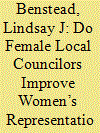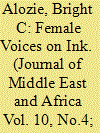|
|
|
Sort Order |
|
|
|
Items / Page
|
|
|
|
|
|
|
| Srl | Item |
| 1 |
ID:
169991


|
|
|
|
|
| Summary/Abstract |
This article surveys the reasons that Arab tribalism, or qabaliyya, has been traditionally associated with nomadism, deserts, and rural populations. This commonplace is present not only in the West, but also in the mentality of urban dwellers in the Arab countries of the Middle East. Despite this misconception, it is well known that tribal people have been settled in cities and towns for decades. Building on this fact, the author argues that Arab tribes have assumed urban models of social organization in order to adapt to their relationships and assure the preservation of personal identity, protection, group solidarity and their capacity for collective action.
|
|
|
|
|
|
|
|
|
|
|
|
|
|
|
|
| 2 |
ID:
169989


|
|
|
|
|
| Summary/Abstract |
British colonial rule in Nyasaland (present-day Malawi), from 1891 to 1966, occurred alongside various businesses owned by British nationals. This article uses the case of the British South Africa Company (BSAC), which fell into the “export production business” category. Departing from earlier studies that emphasize the active and influential role of British businesses in the decolonization process, this study argues to the contrary, and does so by using archival materials, to analyze the history of the company’s involvement in the Protectorate’s economy, before analyzing three main reasons for its decolonization the year that Nyasaland attained its republican status in 1966. The reasons include that the company was not operational having decided not to invest its resources in the Protectorate; the desire by nationalist leaders to have a share in the business sector and to reward other local/African businessmen; and the policy direction of the newly independent administration to revoke dubious claims of land ownership of the colonial period, with a plan to boost the country’s agriculturally based economy to the benefit of the African majority. Nonetheless, as this article posits, most of the people were also disadvantaged by the land policies enacted by the post-colonial political elites. This reality denied them (the ordinary people) an immediate chance to enjoy the “fruits of independence.”
|
|
|
|
|
|
|
|
|
|
|
|
|
|
|
|
| 3 |
ID:
168847


|
|
|
|
|
| Summary/Abstract |
Tunisia’s 2018 municipal elections, in which a legislated quota was implemented and women won 47 percent of seats, raises questions about whether electing female councilors improves women’s representation in clientelistic settings. Using data from the Local Governance Performance Index (LGPI), an original survey of 3,600 Tunisians conducted in 2015 by the Program on Governance and Local Development (GLD), this article investigates the relationship between local councilors’ gender and women’s access to help with personal or community issues. Three findings emerge. First, male citizens are thirteen percentage points more likely than female citizens to know a local councilor and six percentage points more likely to have contacted a councilor for help. This offers evidence of greater network homosociality for club goods than personal requests. Second, citizens of both genders are twice as likely to contact a councilor of the same gender when asking for help with community problems. Finally, electing females increases women’s access to councilors, due to network homosociality—that is, denser personal networks with others of the same gender—but has a limited impact on men’s access because female councilors have more heterosocial networks. By showing that electing and appointing women improves service and allocation responsiveness to females, the results call attention to the need to address gender equity issues when drafting electoral laws and implementing decentralization laws.
|
|
|
|
|
|
|
|
|
|
|
|
|
|
|
|
| 4 |
ID:
169988


|
|
|
|
|
| Summary/Abstract |
The Alliance Israélite Universelle, an international Jewish educational philanthropy based in Paris, began to establish modern, secularized schools for girls and boys in North Africa, the Middle East, and Eastern Europe in 1862. The first school was established in Iran in 1898. The Alliance saw itself as addressing the big questions of its time that faced Jews: antisemitism, poverty, and perceived backwardness. It sought to promote the integration of Jews as well as to advance the status of girls through educating them and opposing child marriage. This article examines the integration of Iranian Jews and the professionalization of women in Iran in the first half of the twentieth century, using the Alliance’s Jewish female school directors as a case study. It argues that family relationships and networks played a critical role in facilitating both of these modernizing processes.
|
|
|
|
|
|
|
|
|
|
|
|
|
|
|
|
| 5 |
ID:
169990


|
|
|
|
|
| Summary/Abstract |
While historians have, of course, employed a host of documentary sources in reconstructing the colonial history of Nigeria, few have used petitions to understand the dynamic negotiations that occurred between the colonizer and the colonized. As a result, a vital primary source of history has been underutilized. Likewise, the voices of women lamentably have suffered the same fate as the use of petitions. This study seeks to fill this important gap by examining selected petitions and written correspondence between Igbo women and British officials in the period from 1892 to 1960. Continuously undermined by male-dominated colonial institutions and structures, African women acted in varied and complex manners from subtle to overt opposition, and sometimes violent resistance. One response was through petition-writing as women took to the pen to articulate their concerns. Petitioning became both a disabling and enabling force in exploring the relationship between subjectivity and power relations. How are scholars to understand the interactions between the often-neglected, ordinary female subjects and the British authorities? To what extent did their petitions shift the balance of patriarchal power and give voice to the otherwise “silent” women? Analysis of petitions written by women in colonial Igboland demonstrates how petition-writing gave females a subtle yet powerful voice, or agency, in a rigidly hierarchical colonial political system. This study argues that instead of simply looking at these petitions as another set of documents, they should be regarded as unique sources in which colonial subjects’ thoughts and desires are revealed. In addition, these neglected sources should be treated as an integral part of the complex power politics among colonial subjects as well as between them and officials. In thinking through these petitions, this case study reframes the sexual politics of petitions and challenges dominant, institutionalized gender ideologies that have defined women as nearly powerless and passive.
|
|
|
|
|
|
|
|
|
|
|
|
|
|
|
|
|
|
|
|
|